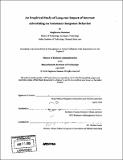| dc.contributor.advisor | Duncan Simester. | en_US |
| dc.contributor.author | Kannan, Raghavan | en_US |
| dc.contributor.other | Sloan School of Management. | en_US |
| dc.date.accessioned | 2007-04-03T17:13:57Z | |
| dc.date.available | 2007-04-03T17:13:57Z | |
| dc.date.copyright | 2006 | en_US |
| dc.date.issued | 2006 | en_US |
| dc.identifier.uri | http://hdl.handle.net/1721.1/37121 | |
| dc.description | Thesis (M.B.A.)--Massachusetts Institute of Technology, Sloan School of Management, 2006. | en_US |
| dc.description | Includes bibliographical references (leaves 29-30). | en_US |
| dc.description.abstract | The long-run effect of banner advertisements is among the most complex topic in the internet world. Media spending on online marketing has grown from $3 billion in 1999 to $9 billion in 2004. Forecasts (Jupiter Research 2005) expect this growth to double in the next five years. The proportion of marketing budgets spent on online advertising is expected to grow from 4.6% in 2004 to 7% in 2010. Banner media costs contribute approximately 60% of the total online media spend across all industries. A portion of this increase can be attributed to the increasing acquisition cost of media/advertising space in the most frequently visited websites. Companies enter into bidding wars to acquire space in a restricted 15"/17" computer monitor screen from service providers like Google, Yahoo, AOL and MSN. Prices for banner advertisement space vary by the number of exposures and even by the time of the day. This directly begs a question on the effectiveness of online banner advertisement in influencing consumer behavior. Currently most firms track immediate response behaviors or the short-run effects. We use an experiment conducted with a student credit card campaign to explain the long-run impact on response behaviors across different audiences by exposing them to promotional advertisements on a public educational website. | en_US |
| dc.description.statementofresponsibility | by Raghavan Kannan. | en_US |
| dc.format.extent | 30 leaves | en_US |
| dc.language.iso | eng | en_US |
| dc.publisher | Massachusetts Institute of Technology | en_US |
| dc.rights | M.I.T. theses are protected by copyright. They may be viewed from this source for any purpose, but reproduction or distribution in any format is prohibited without written permission. See provided URL for inquiries about permission. | en_US |
| dc.rights.uri | http://dspace.mit.edu/handle/1721.1/7582 | |
| dc.subject | Sloan School of Management. | en_US |
| dc.title | An empirical study of long-run impact of Internet advertising on consumer response behavior | en_US |
| dc.type | Thesis | en_US |
| dc.description.degree | M.B.A. | en_US |
| dc.contributor.department | Sloan School of Management | |
| dc.identifier.oclc | 85774269 | en_US |
